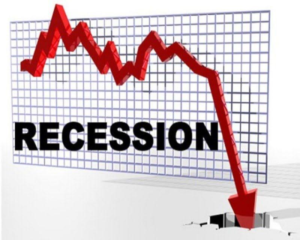Against the run of currency and postulation by the Nigeria’s Finance Minister, the nation’s economy contracted for the fifth consecutive quarter by -0.52 per cent in the first quarter of this year, indicating the country may not yet be out of the woods of recession.

The Gross Domestic Product (GDP) report for the first quarter of the year recently released by the National Bureau of Statistics (NBS) showed a marginal improvement in the economy as the -0.52 per cent GDP recorded at the first quarter of 2017 is 0.15 per cent higher than the -0.67 per cent (revised from -0.36%) recorded in the corresponding quarter of 2016 and higher by 1.21 per cent points from rate recorded in the preceding quarter.
Analysis of the report showed that during the quarter, aggregate GDP stood at N26.03 trillion, an increase from N22.25 trillion, resulting in a Nominal GDP growth of 17.06 per cent.
The report showed that oil production averaged at 1.83 million barrels per day (mbpd), 0.07 million barrels higher than the daily average production recorded in the fourth quarter of 2016.
Oil production during the quarter was lower by 0.22 million barrels per day relative to the corresponding quarter in 2016, which recorded an output of 2.05 mbpd.
Real growth of the oil sector slowed by -11.64 per cent in Q1 2017, representing a decline of -4.81 per cent relative to rate recorded in the corresponding quarter of 2016.
The report showed that ass a share of the economy, the Oil sector contributed 8.90 per cent of total real GDP in Q1 2017, while the Non-Oil sector contributed 91.10 per cent to the nation’s GDP.
Growth in the Non-oil sector was 0.72 and was largely driven by the activities in the Agriculture Sector(Crop Production), Information & Communication, Manufacturing, Transportation and Other Services.
An expert in financial and macroeconomic analysis, Mr. Abiola Razaq, told the Daily Trust that latest GDP report showed that the rate of contraction in the economy has reduced over time.
Mr. Rasaq, who is the Head of Investor Relations at United Bank for Africa Plc, said all available indicators in the country indicate that Nigeria will be out of recession by the second quarter of 2017.
He blamed the contraction in the first quarter of the year on foreign exchange crisis; a problem he noted is improving.
However, he said activities are picking up in the non-oil sector of the economy, a development that is fast driving the economy out of recession.
An economist, who is also the Chief Executive Officer of the Abuja-based DolfMadi International Consulting, Dr. Adolphe Amadi, blamed the continued contraction in the economy on declining productivity and economic sabotage.
Dr. Amadi said the government must put in place deliberate policies to increase productivity and increase spending to pull the economy out of recession.
Expert at the Financial Derivatives Company ý(FDC) said , although the directional movement of GDP growth in the first quarter of 2017 was in line with market consensus, the magnitude still underperformed expectations.
The pace of contraction in the economy slowed to -0.52% in Q1’17 through the combined impact of the oil and non-oil sectors.
“A breakdown of the GDP numbers shows recovery across board. However, what remains troublesome is the persistent decline in the agriculture sector. The sector slowed to 3.39% in Q1’17 from 4.03% recorded in the previous quarter. This, coupled with the rise in naira illiquidity in the market, could undermine recovery and growth targets.” It added.










